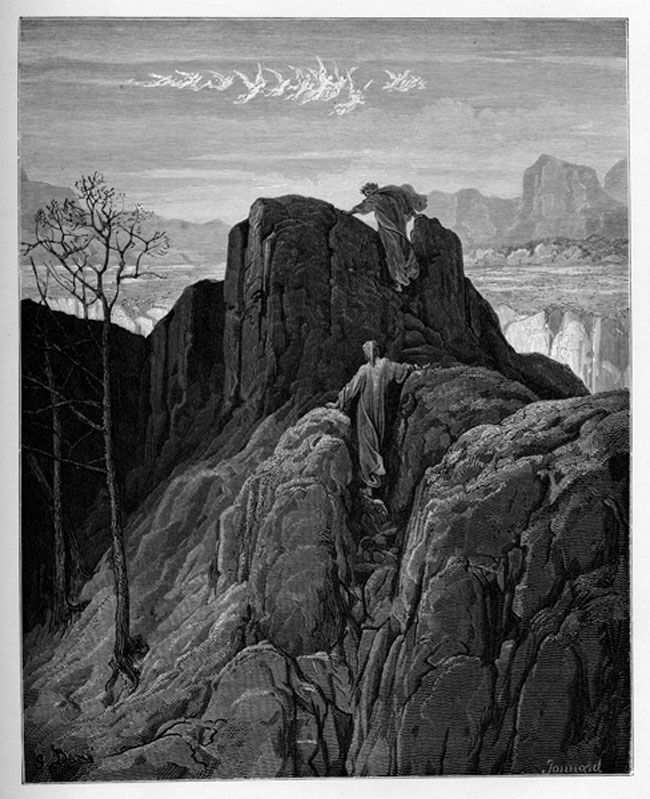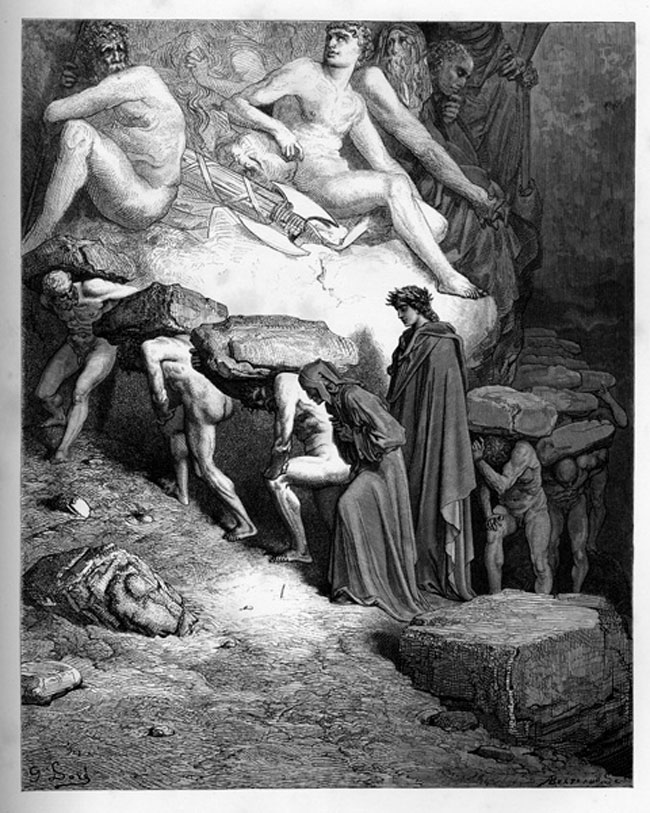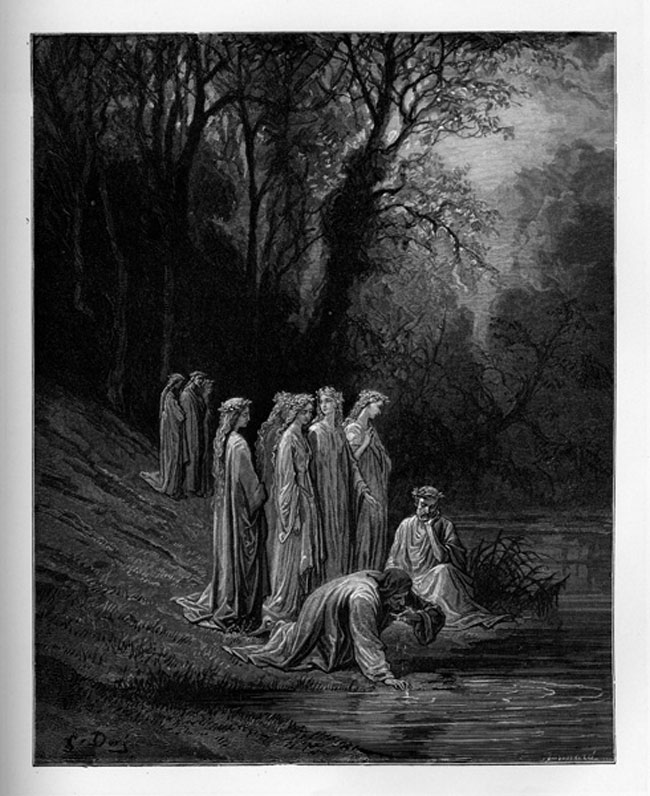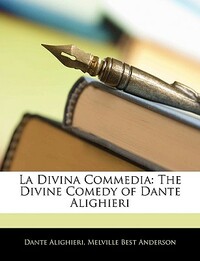Take a photo of a barcode or cover
302 reviews for:
La Divina Commedia: The Divine Comedy of Dante Alighieri
Melville Best Anderson, Dante Alighieri
302 reviews for:
La Divina Commedia: The Divine Comedy of Dante Alighieri
Melville Best Anderson, Dante Alighieri
Decidedly much more somber than the Inferno but just as exhilarating the read. Enjoyed as always Dante's amazing abilities in imagery and metaphor as well as the catharsis reached after the exploration of sin by the appearance of Beatrice and the sudden but nonetheless disheartening departure of Virgil. Will get to Paradiso soon, which I hear is a complete fever dream.
I've never been a huge Divine Comedy fan, especially not the Inferno, so after reading that, I didn't have much hope for the other 2/3 of the story. I did like this more than the Inferno, but, still, I just don't agree with Dante's worldview enough to get really into it.
This translation is interesting, abandoning the strict terza rima by not following through with the rhyme scheme - it's not 'aba bcb' but 'aba cdc.' Also, the meter is whackadoo. Some lines scan great, but a lot are hell (haha, get it) to read in any sort of rhythm. Admittedly it irritated me for a while - the ideal version of Dante's tightly-woven, puzzle-piece poetry is usually what I live for, tbh - but after reading a few cantos of the Penguin edition, which DOES have the terza rima and reasonable meter, I actually sort of like this version better. It's less ornamental, more conversational, as if Dante is actually telling a story, rather than writing a poem. If that makes sense. So I have nothing against this edition, and even enjoy its flaws as something more than flaws. It's good.
There were some good punches of emotion, too, particularly towards the end. Almost all of it has to do with Dante and Virgil interacting. When Dante has to pass through the fire and Virgil's trying to convince him to go? When Dante goes to hide behind Virgil's skirts and Virgil is GONE? Ouch. So good. This version really bromances it up and that was, honestly, my favorite part. Not enough to give it four stars, not hardly, but... still. It deserves a mention.
This translation is interesting, abandoning the strict terza rima by not following through with the rhyme scheme - it's not 'aba bcb' but 'aba cdc.' Also, the meter is whackadoo. Some lines scan great, but a lot are hell (haha, get it) to read in any sort of rhythm. Admittedly it irritated me for a while - the ideal version of Dante's tightly-woven, puzzle-piece poetry is usually what I live for, tbh - but after reading a few cantos of the Penguin edition, which DOES have the terza rima and reasonable meter, I actually sort of like this version better. It's less ornamental, more conversational, as if Dante is actually telling a story, rather than writing a poem. If that makes sense. So I have nothing against this edition, and even enjoy its flaws as something more than flaws. It's good.
There were some good punches of emotion, too, particularly towards the end. Almost all of it has to do with Dante and Virgil interacting. When Dante has to pass through the fire and Virgil's trying to convince him to go? When Dante goes to hide behind Virgil's skirts and Virgil is GONE? Ouch. So good. This version really bromances it up and that was, honestly, my favorite part. Not enough to give it four stars, not hardly, but... still. It deserves a mention.
challenging
mysterious
reflective
tense
slow-paced
Plot or Character Driven:
Plot
Strong character development:
Yes
Loveable characters:
No
Diverse cast of characters:
No
Flaws of characters a main focus:
Yes
dark
emotional
hopeful
inspiring
reflective
slow-paced
64th book of 2021. Artist for this review is, again, French artist Gustave Doré.
Most people never read past Inferno and I often guessed at why: in Hell we have mythical beasts, fire, punishment, demons, etc., and surely that is far more enjoyable to read about then Dante walking about a lovely garden in Paradise, thinking overtly about God and his enlightenment. In her introduction, Sayers (for why I settled on Sayers as the translation, read my review of Hell, which is linked at the bottom of this review) says that Purgatory is the "most beloved" of The Divine Comedy parts. I was sceptical.
Purgatory begins exactly where we left off: with Dante and Virgil climbing out of Hell and standing before the mountain. It begins a little more abstract, a little less interesting, and I was wondering if Sayers had got it wrong. Soon enough though, it found its pace (or I did) and it became as enjoyable as the last book; but for different reasons. Virgil stays as Dante's helpful guide, and they begin their climb of Mount Purgatory.

For one thing, Dante and Virgil's relationship is now better. Virgil is less sharp with Dante, and now Dante can offer suggestions on their journey, which Virgil sometimes heeds. Sayers makes note of how their (friendship is the wrong word, but it's oh so tempting) relationship grows throughout. And even Virgil, at times, in Purgatory, is as surprised or confused by things as Dante is, for he is now out of his realm of expertise and must soon leave Dante, as Beatrice becomes his guide in Paradise. And as Virgil remains Dante guide, Sayers remained mine, and I needed her greatly through this. The main problem with Purgatory is the rise in name-dropping by Dante, and need, for the modern reader, for context. Sayers does a fantastic job yet again at giving brief and concise notes after each and every Canto, discussing both the allusions and interpretations, and even alternative translations (at several points she concedes to a word being changed slightly to fit the meter of the terza rima, but ensures to give the better word in the notes, so nothing is really lost). With Sayers' help with the harder parts, I could enjoy the rest. And where we saw people being punished in various ways in Inferno, we get more of it here in Purgatory.

Above are the Proud, for example, who are made to walk with the burden of great stones. Dante kindly stoops over himself to speak to them, despite having no stone to carry himself.
I won't go through all the different punishments, there's no fun in that. The main interest for me was the meeting of Beatrice and the passing over of guides. (And, as if mirroring the story, my guide is passed over in Paradise as Dorothy Sayers died with 13 Cantos left unfinished and so her friend Barbara Reynolds had to finish them for her/us). I don't consider this a spoiler as many blurbs suggest the eventual meeting of Beatrice and the guides for each Book, but if you don't want to hear about the meeting and Virgil's exit from the story, then don't read ahead.
Dante finally meets Beatrice and when he turns to tell Virgil this, he finds Virgil has already gone, his "duty" finished. I'd like to quote that particular scene, as I found it oddly poignant and sad.
And I must say, strangely, that I too will miss having Virgil as the guide. Though I'm intrigued to see what Beatrice is like instead, and what she speaks of. There is great debate about Beatrice but it's generally accepted that she was married to a banker and died at the age of 24. Dante had met her only twice in his whole life, once as a boy, and then again 9 years later, and there was never anything romantic between them, only Dante infatuation(?), unrequited love(?). She serves several purposes in his work though, which Sayers, of course, also outlines in her notes.
So after a short break, on to Paradise. I may add more in this review shortly, but this is all I can immediately say. On finishing Dante's work I always have so much to say that I can't say anything at all. A real jumble of thoughts, feelings, historical and metaphorical wonderings... They are magnificent pieces of literature.

Hell/Inferno Review.
Most people never read past Inferno and I often guessed at why: in Hell we have mythical beasts, fire, punishment, demons, etc., and surely that is far more enjoyable to read about then Dante walking about a lovely garden in Paradise, thinking overtly about God and his enlightenment. In her introduction, Sayers (for why I settled on Sayers as the translation, read my review of Hell, which is linked at the bottom of this review) says that Purgatory is the "most beloved" of The Divine Comedy parts. I was sceptical.
Purgatory begins exactly where we left off: with Dante and Virgil climbing out of Hell and standing before the mountain. It begins a little more abstract, a little less interesting, and I was wondering if Sayers had got it wrong. Soon enough though, it found its pace (or I did) and it became as enjoyable as the last book; but for different reasons. Virgil stays as Dante's helpful guide, and they begin their climb of Mount Purgatory.

For one thing, Dante and Virgil's relationship is now better. Virgil is less sharp with Dante, and now Dante can offer suggestions on their journey, which Virgil sometimes heeds. Sayers makes note of how their (friendship is the wrong word, but it's oh so tempting) relationship grows throughout. And even Virgil, at times, in Purgatory, is as surprised or confused by things as Dante is, for he is now out of his realm of expertise and must soon leave Dante, as Beatrice becomes his guide in Paradise. And as Virgil remains Dante guide, Sayers remained mine, and I needed her greatly through this. The main problem with Purgatory is the rise in name-dropping by Dante, and need, for the modern reader, for context. Sayers does a fantastic job yet again at giving brief and concise notes after each and every Canto, discussing both the allusions and interpretations, and even alternative translations (at several points she concedes to a word being changed slightly to fit the meter of the terza rima, but ensures to give the better word in the notes, so nothing is really lost). With Sayers' help with the harder parts, I could enjoy the rest. And where we saw people being punished in various ways in Inferno, we get more of it here in Purgatory.

Above are the Proud, for example, who are made to walk with the burden of great stones. Dante kindly stoops over himself to speak to them, despite having no stone to carry himself.
I won't go through all the different punishments, there's no fun in that. The main interest for me was the meeting of Beatrice and the passing over of guides. (And, as if mirroring the story, my guide is passed over in Paradise as Dorothy Sayers died with 13 Cantos left unfinished and so her friend Barbara Reynolds had to finish them for her/us). I don't consider this a spoiler as many blurbs suggest the eventual meeting of Beatrice and the guides for each Book, but if you don't want to hear about the meeting and Virgil's exit from the story, then don't read ahead.
Dante finally meets Beatrice and when he turns to tell Virgil this, he finds Virgil has already gone, his "duty" finished. I'd like to quote that particular scene, as I found it oddly poignant and sad.
There came to me, needing no further sight,
Just by that strange, outflowing power of hers,
The old, old love in all its mastering might.
And, smitten through the eyesight unawares
By that high power which pierced me, heart and reins,
Long since, when I was but a child in years,
I turned to leftward—full of confidence
As any little boy who ever came
Running to mother with his fears and pains—
To say to Virgil: "There is scarce a dram
That does not hammer and throb in all my blood;
I know the embers of the ancient flame."
But Virgil—O he had left us, and we stood
Orphaned of him; Virgil, dear father, most
Kind Virgil I gave me to for my soul's good;
And not for all that our first mother lost
Could I forbid the smutching tears to steep
My cheeks, once washed with dew from all their dust.
And I must say, strangely, that I too will miss having Virgil as the guide. Though I'm intrigued to see what Beatrice is like instead, and what she speaks of. There is great debate about Beatrice but it's generally accepted that she was married to a banker and died at the age of 24. Dante had met her only twice in his whole life, once as a boy, and then again 9 years later, and there was never anything romantic between them, only Dante infatuation(?), unrequited love(?). She serves several purposes in his work though, which Sayers, of course, also outlines in her notes.
So after a short break, on to Paradise. I may add more in this review shortly, but this is all I can immediately say. On finishing Dante's work I always have so much to say that I can't say anything at all. A real jumble of thoughts, feelings, historical and metaphorical wonderings... They are magnificent pieces of literature.

Hell/Inferno Review.
medium-paced
I'm not going to give this a star rating right now because it confused me even more than Inferno, although I did like the ending scene a lot (it felt like Till We Have Faces and Perelandra and The Silver Chair all in one, which means maybe Lewis liked Purgatorio? I don't know if that's true, but I wouldn't be surprised).
This central panel in Dante's great triptych brings the sojourner out of the infernal regions of the damned on a journey of purification -- the purgation of sin. Those in purgatory are assured entrance into the paradise awaiting them above, but must first shed their old skins through apropos acts of atonement. This, on the surface of things, describes Dante's journey to reunion with his beloved Beatrice. Along the way, however, the poet creates a dizzying amalgamation of... well, just about everything under the sun, from theology to science to art to the political intrigues of 13th century Italy. And this is where a skilled translator shines.
John Ciardi's translation is clear and direct. However, given the fact that it is not commonly referenced, it must have failed the test of time. He chooses to render Dante's original into enclosed tercets, which makes for relatively easy reading. However, Dante is never a truly easy read, especially given his proclivity for referencing obscure figures both from distant history and from his own age. Ciardi does an exemplary job of illuminating these endless references. The basic problem for any translator is the fact that the explanatory notes will outweigh, in sheer volume, the substance of the original text itself. Thus, even the best translation will amount to a laborious read.
John Ciardi's translation is clear and direct. However, given the fact that it is not commonly referenced, it must have failed the test of time. He chooses to render Dante's original into enclosed tercets, which makes for relatively easy reading. However, Dante is never a truly easy read, especially given his proclivity for referencing obscure figures both from distant history and from his own age. Ciardi does an exemplary job of illuminating these endless references. The basic problem for any translator is the fact that the explanatory notes will outweigh, in sheer volume, the substance of the original text itself. Thus, even the best translation will amount to a laborious read.





